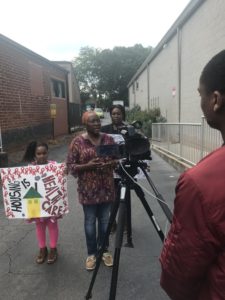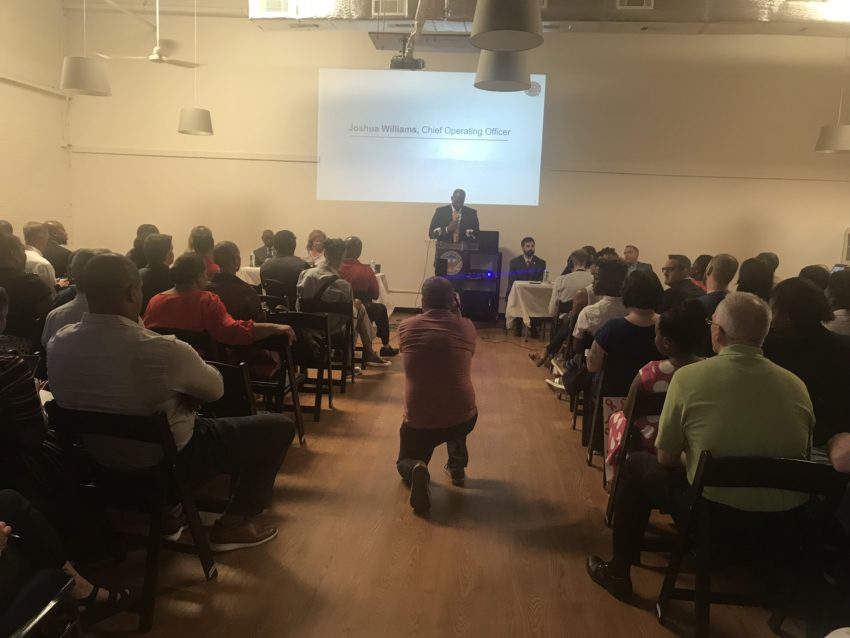We interviewed PWN Georgia State Lead Shyronn Jones to get an understanding of the housing crisis that affected people in Atlanta living with HIV, and how PWN members have been responding.
Q. Can you please describe what the HOPWA program means for people in Atlanta living with HIV?
A. HOPWA offers a variety of housing solutions and support services for low-income people living with HIV and AIDS who are vulnerable to homelessness. Low-income housing options are limited for renters in Atlanta, especially in gentrifying neighborhoods. Most of Atlanta’s low-income housing projects have been demolished in the midst of high poverty and high housing costs, leaving dilapidated remnants of old and a saturation of new private housing developments that are both difficult to afford. An issue with securing either of the two is that a renter’s income usually must meet a 3 times the monthly rent qualification, which is usually unattainable for people who face socioeconomic disparities due to racism and living with the most socially stigmatized health condition in the city that is at the center of the domestic HIV epidemic.
Q. How was this program compromised?
A. The City of Atlanta canceled its contract with The Living Room, Georgia’s largest HOPWA facilitator of emergency and transitional housing for people living with HIV and AIDS, without a backup plan to assist the over 1,500 individuals served each year by this non-profit housing organization or to maintain the housing of over 250 active clients who receive subsidized rental assistance and other forms of housing support services. So a lot of people were facing evictions or power shut-offs or both.
The first signs of this trouble I saw were from a local TV news report of the City of Atlanta launching an on-site review and audit of the Living Room operations and discovering disconcerting findings. Then recently a lawsuit filed in Fulton County Superior Court by the Living Room against the City of Atlanta claiming the former Director of Atlanta’s Office of Human Services made romantic advances toward Living Room Executive Director. [Editor’s note: The lawsuit was recently dropped.] In layman’s terms–for people living with compromised immune systems, housing was compromised due to the actions of dis-service providers!
Q. To my understanding the city of Atlanta withheld millions in HOPWA funding used to pay rent and utilities for Atlantans living with HIV. Just how long were the funds withheld and what was the impact?
A. The City of Atlanta withheld funding the Living Room for almost a year. According to the U.S. Department of Housing and Urban Development (HUD), the City of Atlanta has failed to spend $41 million in HOPWA funding that was allotted for rent, utilities and other support services for Atlantans living with HIV/AIDS. There was $2.2 million left of a $14.2 million grant in 2014, $720,000 left of an $18.1 million grant in 2015, $4.9 million left of a $22.9 million grant in 2016, $11.1 million left of a $23.1 million grant in 2017 and $21.2 million left of a $23.1 million grant in 2018. All of this amounts to about 40 percent of the $101 million allocated since about 2014. The City of Atlanta was chronically late on payments to the Living Room and other nonprofit housing organizations that serve people living with HIV.
Numerous HOPWA nonprofits that contract with the city are facing long reimbursement delays. The City of Atlanta has failed to reimburse Living Room $500,000, Positive Impact Health Centers about $1 million and others. As for the impact–the tardy payments have threatened the financial health of agencies that provide HOPWA services and resulted in nonprofit housing organizations refusing to help people living with HIV with securing emergency and/or long-term housing. As for the over 250 active clients of Living Room, they are at risk of eviction because the Living Room has not been able to pay its portion of clients’ subsidized rent for over 5 months.
Q. How did the impacted community advocate for the HOPWA crisis to be resolved?
A. A coalition of local advocates had been requesting HOPWA reforms for more than a year. Most recently, on July 16, community advocates sent the City of Atlanta a letter signed by 95 people requesting the City Council to return immediately from recess to legislate solutions to the crisis. Atlanta City Council did not respond with urgency; their proposal to release $1.5 million to cover 8 HOPWA entities was held for a vote on Aug. 5.
Advocates also demanded answers, accountability, and solutions from Mayor Keisha Lance Bottoms administration at its August 1 community meeting to discuss the City of Atlanta’s proposed plan for restructuring how the city manages federal grants, including aligning the future programmatic management of HOPWA funds under the Atlanta Homeless Continuum Of Care, managed by Partners For HOME.
Lisa Britt, a member of PWN and part of the group of local advocates in Atlanta who have been organizing to push the City of Atlanta officials to resolve this HOPWA housing crisis, is one of those who almost lost her housing because of the City’s failure to pay. You can read Lisa Britt personal story in her op-ed published on thebody.com.
Q. What has the outcome been so far?
A. Partners for HOME, a nonprofit the city created to provide homelessness services, will take over the HOPWA program for the 2020 funding cycle. Notably, the City has considered this reorganization in recent months because of the future federal funding cuts to Atlanta’s HOPWA grant.
The City of Atlanta has proposed a draft plan for restructuring management of the city HOPWA program. The planned restructuring and improvements are based on the principles of:
- Better serving the individuals in need;
- Better support for grant sub-recipients and service providers;
- Improving monitoring, compliance, transparency and accountability; and
- Increasing housing quality standards, expanding collaboration and strengthening service delivery.
Q. What more do you want to say about the Atlanta HOPWA crisis?
A. The Atlanta HOPWA crisis happened because of blatant disregard for improving the lives and upholding the rights of people living with HIV. My message to the people who are responsible for Atlanta HOPWA crisis is to SUPPORT THE DIGNITY, RIGHTS AND RESPECT OF PEOPLE LIVING WITH HIV–NOT JUST YOUR PAYCHECKS!





Shyronn Jones did a wonderful job explaining what is really going on with the HOPWA crisis here in Atlanta. We should have not been affected because of someone elses personal advances toward another person.